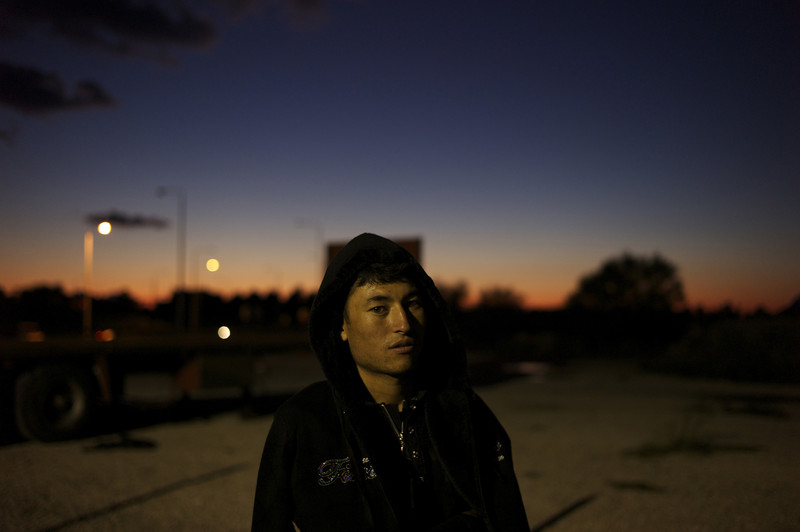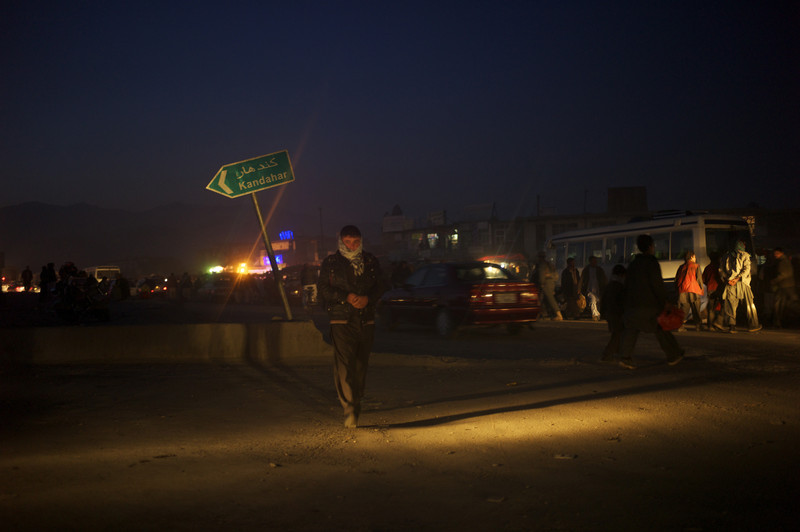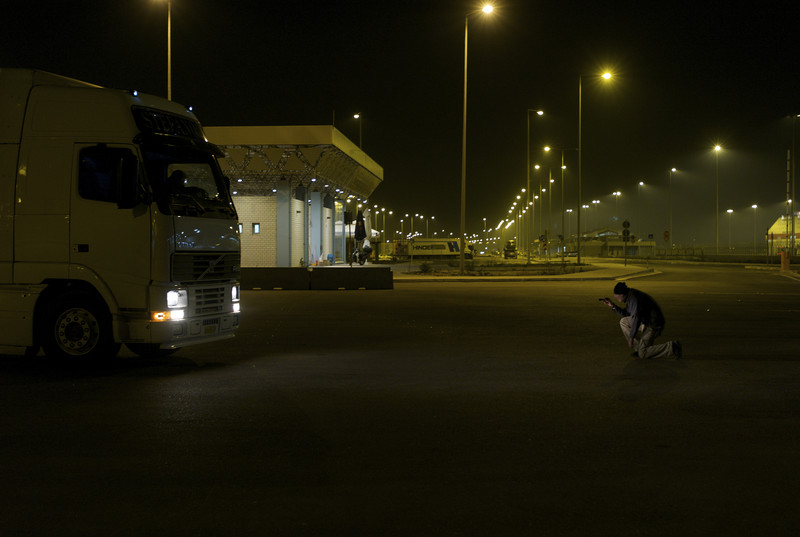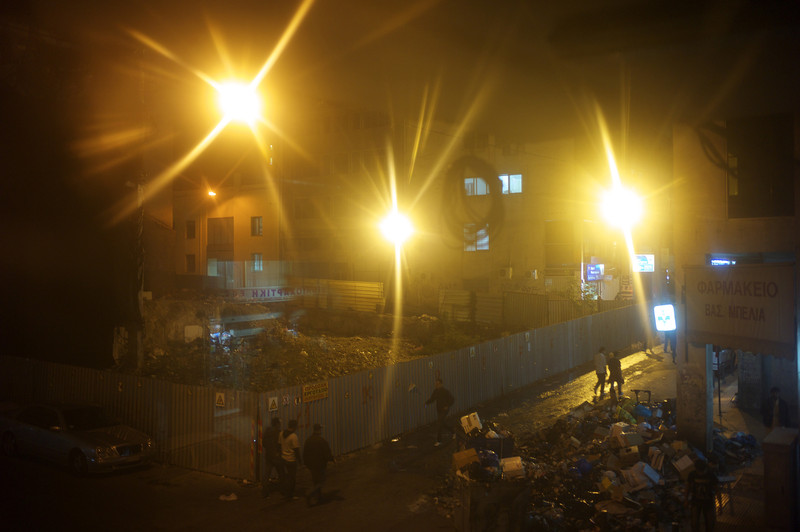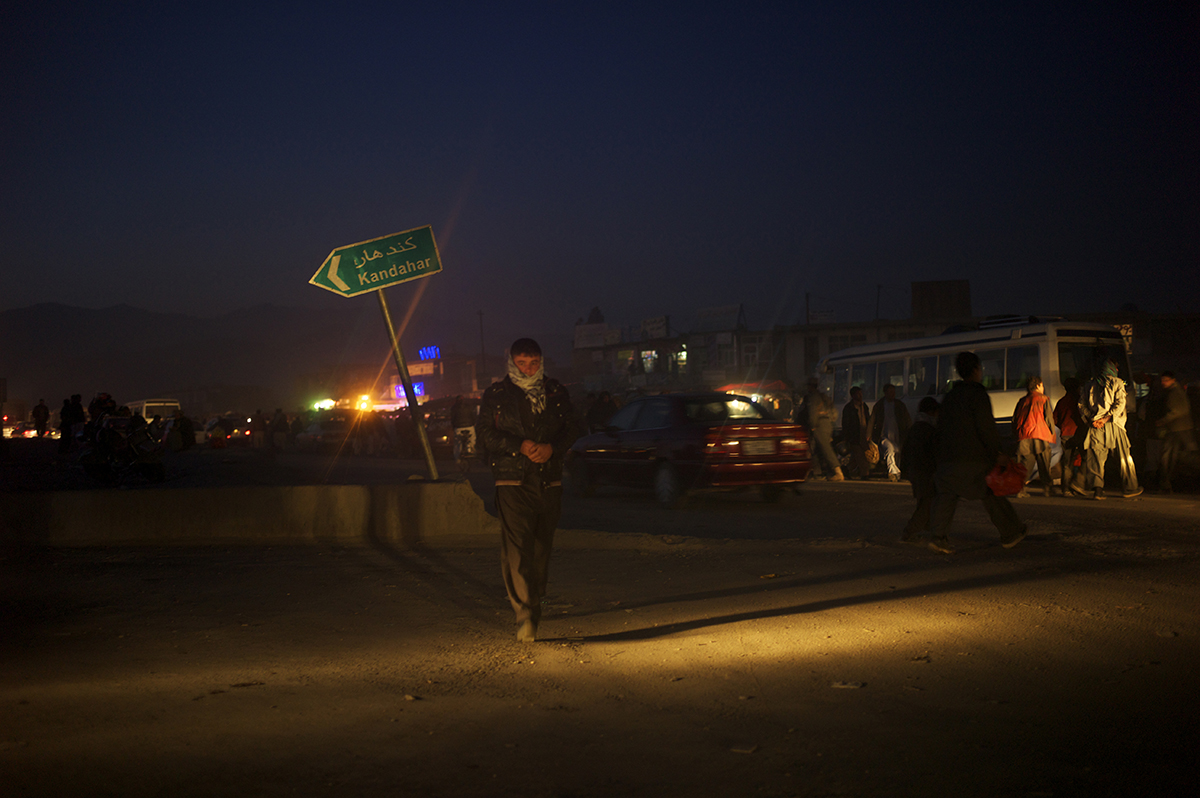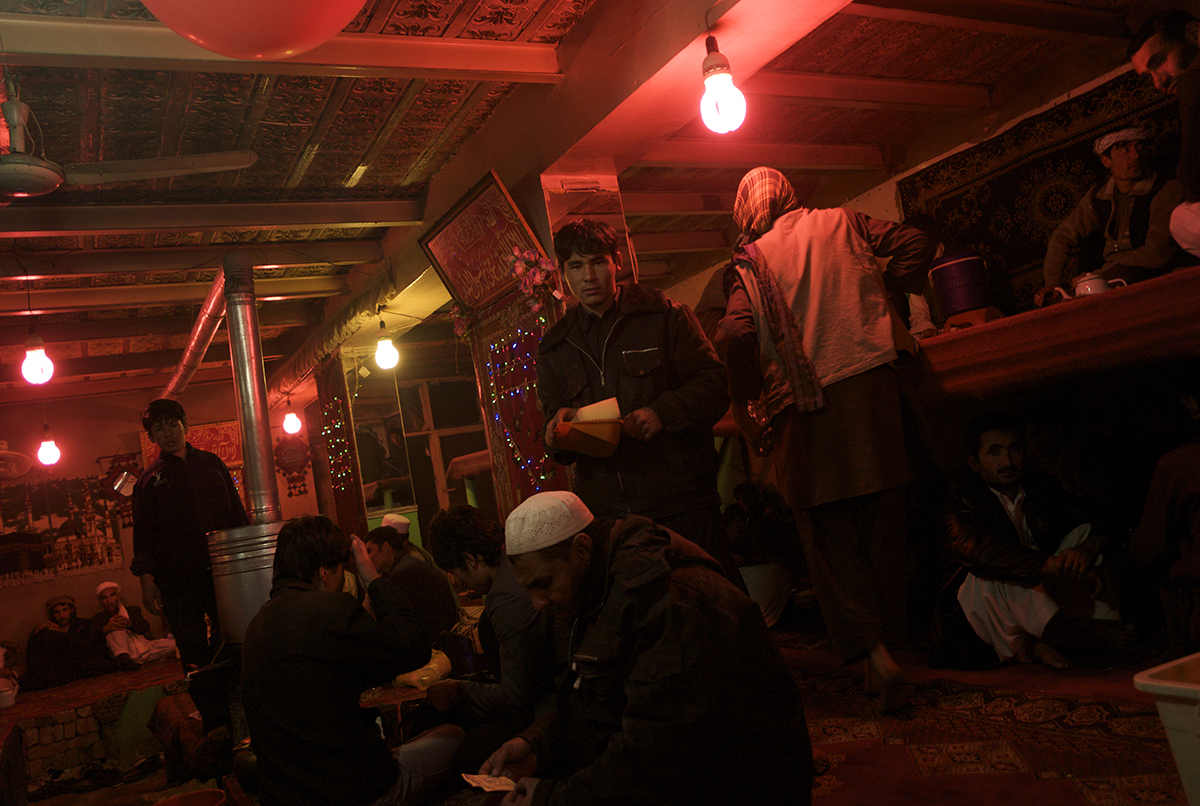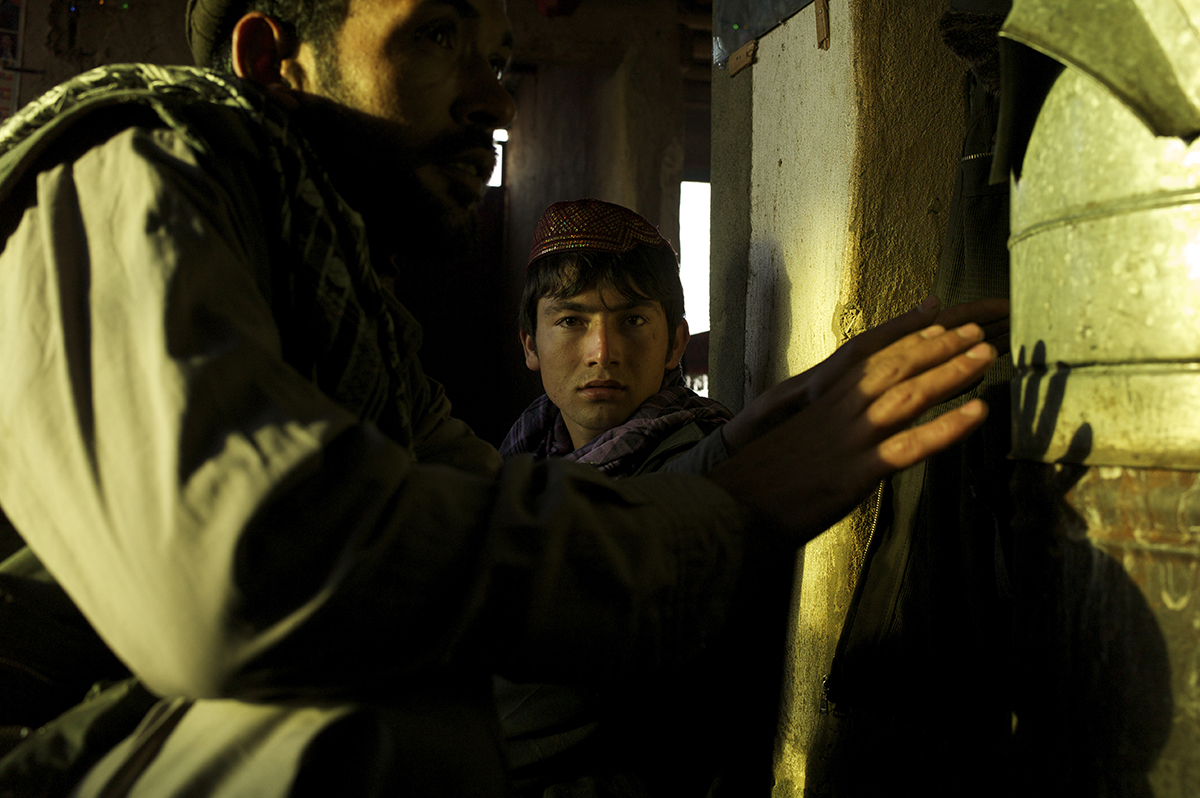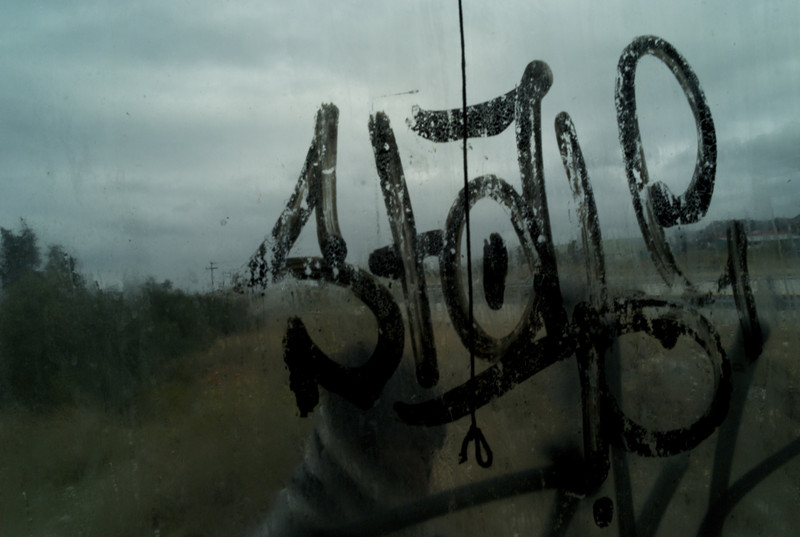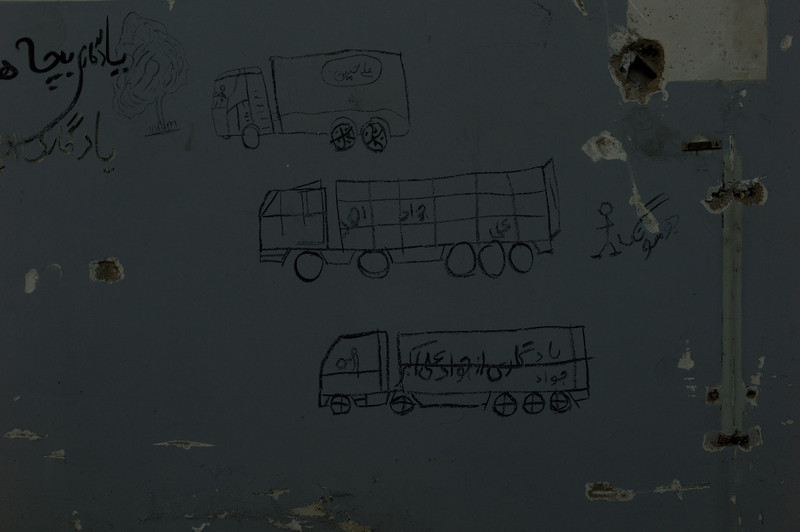The Flowers of Afghanistan
by Alixandra Fazzina
Introduction
Afghanistan, Kabul, December 2011, Under the green fluorescent lights of a shelter, a teenage traveller in ear muffs waits outside a mosafer khana in the grounds of the Company area bus station.
A third of all the world’s refugees are from Afghanistan. The Russian Occupation, Warlordism, Taliban rule and the War on Terror have left an estimated five million people displaced beyond the country’s borders. Three decades of conflict have left a shrinking humanitarian space and as poverty and insecurity in the region worsen, a new generation is looking further afield in search of a better life.
Growing numbers of vulnerable Afghan youths continue to make the difficult and dangerous overland journey to Europe. Last year saw a 64% increase in unaccompanied minors from Afghanistan arriving in the European Union who applied for asylum, the average age being just 14-15 years old. Traveling alone they are exposed to abuse and exploitation by criminals or by the very smuggling networks in which their lives are placed.
Ten years on from 9/11, the surge in the numbers of children entering Europe should be cause to reflect on the plight of Afghanistan’s youth in the shadow of war.
As the recipient of the 2010 UNHCR Nansen Refugee Award for her work documenting the often-overlooked humanitarian consequences of war, photographer and author Alixandra Fazzina’s newest reportage portrays the individual stories of Afghan children on the move. Following the Flowers of Afghanistan on their clandestine routes from Asia to Europe, the work intimately explores the motives, paths and significance of this new exodus.
In Company
Pegging up his black holdall onto the wall, Farshad ducks down next to a traditional stove, keen to get warm after his chilly transit through Kabul. Inside a mud-built mosafer khana, the boy from Logar is surrounded by travellers, all hunched in the centre of the large carpeted room. In sweatbands and a leather jacket, Farshad squints in the golden evening light, scanning his surroundings where the next eight hours or so will be spent holed-up. He nods at a small boy who comes over with a green enamel pot of tea and a round of sweets before slowly settling down. Having spent the last five years growing up on the road labouring in Iran after the death of his father, Farshad is once again making the clandestine journey out of Afghanistan. This time however, he plans to go further afield, “Europe is the place, it’s much better than Asia. Fifteen of my friends are there now; five in France, four in Norway, some in the UK and the rest elsewhere. They tell me there is education, work and law in those countries so now I’ve also made up my mind to go”.
“Europe is the place, it’s much better than Asia. (...) So now I’ve also made up my mind to go”
- Farshad
Afghanistan, Kabul, February 2012, Arriving in Kabul from Logar province, seventeen year old Farshad settles down beside a bukhari stove at the Palawan Ghani Mosafer Khana, set back from the mud and chaos of the Company district bus station.
As the light begins to fade and the mosafer khanas fill up, the activity at Company moves inside. In a place notorious for kidnappings and robberies, it is now time for the passengers to wait out the night nervously in the sanctuary of their chosen hotels. Using their baggage as pillows, groups from provinces across Afghanistan spread themselves out as best they can. Hard as it is to relax in a place where even the piles of shoes left by the doorways are stolen, most sit solemn faced. Touts, hawkers and ticket sellers do the rounds leaving only the moneychangers and phone card salesmen stranded outside under lamps at an impromptu traveller’s bazaar.
Afghanistan, Kabul, March 2012, Behind a cracked windowpane strung with fairy lights, a few passengers who are unable to sleep watch a game of football on a television set surrounded by rows of bodies passed out under sheets.
Afghanistan, Kabul, March 2012, Travelling as part of a group of six young men, sixteen year old Abdul Wased rests up against the wall in a mud built back room of a mosafer khana at the Company area bus station west of Kabul.
Respective landlords, who charge for food not board, sit feeding pounded meat onto skewers as kebabs are prepared for the communal dinners. Up on a wooden platform that makes for an extra sleeping level, a group of eight boys who have paid up with the smugglers until Turkey play with their mobile phones. They anticipate that the journey they are embarking upon will take around seven days although their plan is to continue further and “inshalla’ah”, make it to Europe. Aged between fourteen and seventeen it is the first time they have ever left their homes in Baghlan alone.
Over Mountains, Underground
Turkey, Istanbul, January 2012, Finishing his shift at close to midnight, sixteen year old Imamuddin heads out up a metal stepladder through the carved-out entrance to the underground kargah in Zeytinburnu where he has recently found work.
Rubbish clutters the entrance to a narrow backstreet in Istanbul’s downtown Kumkapi district. Derelict houses crumble down the hillside where exposed stairwells lead nowhere. Little traffic ventures down this dead-end or through the doors of the dimly lit Regal Hotel, hidden away at the furthest extent of this blind alley. In the net curtained modern lobby, an Afghan smuggler who doubles up his work in Kabul’s Ministry of Defence, sits in a bruise coloured salwar khamees chatting in Farsi with a Kurdish counterpart. The majority of the passengers holed-up at the hotel have just arrived from Afghanistan and in the upper rooms, boys like fifteen year old Fayaz are being held captive, "When I arrived in Istanbul the smugglers kept me for twenty-two days."
"We stayed in a room at the Regal and weren’t allowed to go outside. The place looked official but it was just for illegal travellers. Three other Afghan boys were also kept in my room and there was a young African child who was kidnapped like us. One of the agents was always on the door and they told us that they were armed. All we could do was to walk the corridors and the whole place was really cold. I remember one day that I managed to go up to the roof with the other boys, looking out to sea trying to plan an escape but there was no way out. We were all so anxious and cried a lot."
Turkey, Istanbul, January 2012, Next to a mattress balanced over the basement stairs, fourteen year old Abdul Hashim stands amid the cluttered storeroom in the kargah where he has spent the past months cutting cloth.
Turkey, Istanbul, January 2012, Moneychangers and second hand mobile phones sellers ply their trade around a busy, neon-lit junction in Istanbul's downtown Aksaray district.
There were three guards for all the passengers and almost no place to sleep or to sit down. The place smelt terrible and was totally wet and dirty. It was basically a prison where they charged people to stay… Turkey is a really dangerous place to travel for young Afghans”. For teenagers like Manan, the lights of the big city are a world away from the subterranean life they now face. The mosaferin in Istanbul rarely see the light of day.
The Mafia Hotel
Greece, Athens, October 2011, As lunch winds down and the plastic mat that is used in place of a table is folded away, eleven year old Baseer leans against the wall, watching as the older boys retreat to the window to smoke a joint.
Wearing an over-sized salwar kameez and a prayer cap, the agent flicks back his long hair and gets up from the table to go outside into the street to light up a joint. His two even larger colleagues sit playing with their cigarette packets, backed by a wall covered with the sawn, varnished ends of tree trucks that give the smoky café a seventies forest effect. Unable to read the faded Hellenic sign that sits above the glass frontage, the Pashtun mafia’s hang out is known only after the public call office located across the street. On a junction in the seedy, downtown neighbourhood of Omonia, the anonymous café is where the Afghan boys in Athens hang out.
Greece, Athens, October 2011, Facing Mecca and the world outside, thirteen year old Gulistan kneels down on a mat as he says his prayers at Asr in the flat of his smuggler in Athens that is now a temporary home to fifteen Afghans.
Greece, Athens, October 2011, Seen through the window of a Pashtun smuggler's café known simply as "Bashir PCO" after the international call centre across the road, piles of rubbish sit piled up at a junction on Omonia's Xouthou Street.
Leaning against a railing that is surrounded by piles of stinking garbage, fourteen year old Majid is under the spell of a smuggler who lends him an arm around the shoulder. Teenagers flick through the messages in their mobile phones, muttering quietly around the back of a van selling cheap vegetables, hoping that they might also catch the eyes of one of the big men. Rumours are circulating that prices to leave Greece in a container have risen by five hundred Euros and that anyone wanting to go to Germany or Belgium must sit tight for a few weeks. From the tables inside where the gangs of smugglers perch each afternoon, there is an all round view of the goings on. Looking through the broken perimeter of a metal fence that surrounds the site of a now demolished building, they watch over to a narrow alleyway, to the Mafia Hotel.
Greece, Athens, November 2011
Heading back from prayers at an underground mosque, a group of boys make their way up the narrow side street. Sticking close to a wall, they divert their gaze from an agent wielding a plank of wood who is beating a Bengali man accused of stealing from inside one of his rooms. Squatting down in short skirts, three young women taking a break from working the pavements, clearing a spot on this one to snort lines of speed from the dirty ground. The boys rush through the always-open doors and into the lobby of the unmarked six-storey apartment block. Fluorescent bulbs cast a putrid light on the bright yellow walls that are sprayed randomly with Xs around the single broken-down elevator. It is a hard push to climb up the winding stairs past the teens who started smoking upon reaching Europe. “It’s not possible to smoke in Afghanistan but now we are here in Athens we have all started to relieve the tension. The people here at the hotel are in the middle stage; they start drinking and taking drugs so they can forget their dreams”. Standing around the corridors etched with residents’ names and a sign reading the Flowers of Afghanistan and Pakistan, it is a brief escape from the overcrowded bedsits.
First Sea
Greece, Patras, October 2011, Bracing a fierce gale, eighteen year old Mohammad Isa heads out into the sea under stormy skies to wash his blanket that was blown away into the mud during the storms that have torn through Western Greece over the past days.
Shielding his eyes from the smoke, sixteen year old Ellum stirs a pot full of macaroni, rice and lentils bubbling on an open fire at the end of a half-flooded drainage tunnel running under the main Athens highway, “We call this dish Patras Pilau”. Home to around thirty teenagers the filthy underground chamber is just one of around a dozen illegal settlements dotted around Greece’s western port city. Ellum sits alone, assigned to his weekly cooking duty, “The others are out; they’ve gone down to the river to wash their clothes”, he gestures to a friend, pointing in the direction of the beach. Thousands of miles from landlocked Afghanistan, this is the first time the teenagers in Patras have ever been confronted by the sea, and all have come here with a wish to cross it.
“The young people are the wealth of Afghanistan and we are losing them” -Ali
After months on the highway, many of the wayfarers have lost their will to continue. In the roofless shell of an old beachfront nightclub, seventy young Hazaras are presided over by their father figure Ali, a former journalist from Ghazni. Around the litter-strewn black and white chequered dance floor, boys as young as twelve sit out of the cold sea winds, wrapped in blankets under truck tarpaulins hemmed into the walls. Lost in their own worlds, many have turned to drugs as an alternative escape. Ali has seen boys come and go over the past few years but he has also seen many come to the end of the road in Patras, “The people who are deciding to come to Europe- they aren’t coming just for a visit, they are escaping instability but when they reach here they find their problems are worse. Everybody in this camp has a hope for their lives and it’s only because of their aims that they endure these conditions. The young people are the wealth of Afghanistan and we are losing them”.
Greece, Patras, October 2011, Strong winds blow through the pampas grasses surrounding a crudely built shelter just illuminated by the glow from the nearby Silk Road petrol station at night, at a spot known locally to Afghans as Pump Benzene Camp.
Wrapping themselves up in gloves, hats and jackets found in the garbage, Ellum and his newly arrived fifteen year old friend Mohammad Sadaq rush to get back out on the Italy Stop. Just two weeks after arriving in Patras Sadaq’s skin is covered in flea bites and he is quickly losing weight. “I was compelled to leave Afghanistan two years ago just to save my life… Everyday I stand out by the traffic lights I just think about my mother, my father, brothers and sisters. I have to make this journey now matter how dangerous it is because of them”. Breaking off from the group, Ellum and Sadaq wander the three kilometres along the pebbly sea front past rows of neon lit shops selling Tickets to Italy.
Greece, Patras, November 2011, Under a structure of scaffolding and salvaged partition walls, a teenage Afghan boy crouches down outside a shelter pitched under a bend in the highway on the main Athens to Patras road.



